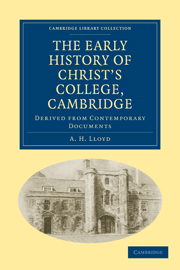Book contents
- Frontmatter
- Preface
- Contents
- LIST OF ILLUSTRATIONS
- List of Abbreviations
- Chronological Summary
- Dedication
- Chapter I William Byngham, the First Founder
- Chapter II The Dispute with John Langton
- Chapter III The First Royal Licence, 1439
- Chapter IV The Expansion of the Milne Street Site
- Chapter V The Royal Licences of 1442
- Chapter VI Marking Time: 1443 to 1446
- Chapter VII The Royal Licence of 1446 and its period
- Chapter VIII The Foundation Charter of the College of Godshouse and its period
- Chapter IX The Relationship of Godshouse and Clare Hall
- Chapter X The Last Days of William Byngham
- Chapter XI The Proctorship of John Hurte, 1451–1458, and of William Fallan, 1458–1464
- Chapter XII The Proctorship of William Basset, 1464–1477
- Chapter XIII The Proctorship of Ralph Barton, 1477–1490
- Chapter XIV The Proctorship of John Syclyng: Early Years, 1490–1496
- Chapter XV The Proctorship of John Syclyng: Later Years, 1496–1506
- Chapter XVI The Negotiations between Godshouse and the Lady Margaret
- Chapter XVII Syclyng's Death and Will
- Chapter XVIII The Buildings and Furniture remaining from the Godshouse period
- Chapter XIX Godshouse and Christ's College
- Appendix
- Index
- Plate section
Chapter XII - The Proctorship of William Basset, 1464–1477
Published online by Cambridge University Press: 05 October 2010
- Frontmatter
- Preface
- Contents
- LIST OF ILLUSTRATIONS
- List of Abbreviations
- Chronological Summary
- Dedication
- Chapter I William Byngham, the First Founder
- Chapter II The Dispute with John Langton
- Chapter III The First Royal Licence, 1439
- Chapter IV The Expansion of the Milne Street Site
- Chapter V The Royal Licences of 1442
- Chapter VI Marking Time: 1443 to 1446
- Chapter VII The Royal Licence of 1446 and its period
- Chapter VIII The Foundation Charter of the College of Godshouse and its period
- Chapter IX The Relationship of Godshouse and Clare Hall
- Chapter X The Last Days of William Byngham
- Chapter XI The Proctorship of John Hurte, 1451–1458, and of William Fallan, 1458–1464
- Chapter XII The Proctorship of William Basset, 1464–1477
- Chapter XIII The Proctorship of Ralph Barton, 1477–1490
- Chapter XIV The Proctorship of John Syclyng: Early Years, 1490–1496
- Chapter XV The Proctorship of John Syclyng: Later Years, 1496–1506
- Chapter XVI The Negotiations between Godshouse and the Lady Margaret
- Chapter XVII Syclyng's Death and Will
- Chapter XVIII The Buildings and Furniture remaining from the Godshouse period
- Chapter XIX Godshouse and Christ's College
- Appendix
- Index
- Plate section
Summary
There is no possibility of declaring with certainty William Basset's family or the county whence he came. Dr Peile thinks he may have been ‘a Bassett of Fledborough’, Nottinghamshire, but he offers no supporting evidence, while, for reasons to be stated later, there is ground for suggesting as his place of origin the county of Northampton, where the Bassets were a numerous family of some importance.
He is assumed to be the William Basset who comes before us as a questionist on the first page that has survived of Grace Book A, that for the academical year 1454/5, and in 1459 becomes inceptor in arts. In the year 1474/5 he has a grace as bachelor in divinity (S.T.B.), which was the degree held by the Basset who was Proctor of the college. He did not proceed to the doctorate of divinity (S.T.P.), but, in the year 1478/9, he is mentioned once more in the Grace Book, when he has a grace exempting him from attending university congregations unless specifically summoned thereto.
One William Basset, priest, was instituted incumbent of Benefield, near Oundle, 23 April 1449, and remained there until the end of 1460, his successor being instituted 27 January 1461. If the Benefield man who surrendered that living in order to take the prebendal stall at Stoke by Clare, now to be mentioned, was the William Basset of Grace Book A, it would follow that he took or completed his university course after being ordained priest.
- Type
- Chapter
- Information
- The Early History of Christ’s College, CambridgeDerived from Contemporary Documents, pp. 171 - 188Publisher: Cambridge University PressPrint publication year: 2010First published in: 1934



